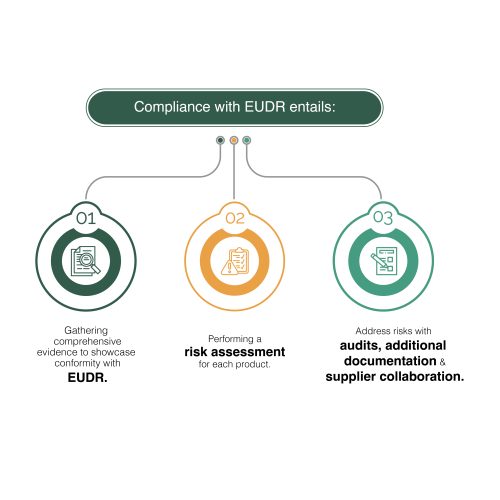Background:
According to the Food and Agriculture Organisation of the United Nations, deforestation is the second most important factor contributing to climate change. The burning of fossil fuels comes first. Deforestation accounts for approximately 20% of greenhouse gas emissions. The European Union (EU) is actively combating the expanding issue of deforestation to tackle climate change, such as EUDR.
Implications of EUDR:
The significant deforestation legislation- EUDR, enacted by the EU, prohibits the import of commodities such as coffee, beef, soy, and others into the market unless companies can furnish ‘verifiable’ proof that these products were not cultivated on land deforested after 2020.
Operators and merchants must adhere to the following guidelines as of December 31, 2020, to guarantee that goods entering the EU market are made on territory free of deforestation or ‘forest degradation’ such as:
- Gather comprehensive evidence showcasing conformity with the EU deforestation regulation.
- Perform a risk assessment for each product to assess the potential for non-compliance with the EUDR.
- Address risks by conducting independent surveys or audits, acquiring additional documentation, or collaborating with suppliers, especially SMEs, through capacity-building and investments.

How can traceability help navigate the challenges of EUDR compliance?
Traceability is a potent instrument for regulatory compliance, enabling companies to attain a transparent understanding of their origin, operations, products, and supply chains. This not only aids in adhering to legal mandates but also cultivates trust among consumers, stakeholders, and regulatory bodies.
How does the RightOrigins platform showcase EUDR requirements?
Product verification and authenticity: Traceability allows regulators and authorities to verify the authenticity of products throughout their lifecycle. It helps ensure that products are deforestation-free and prevents illegal logging.
Regulatory reporting: Many industries must report various data points to regulatory bodies. Traceability systems facilitate the collection, organisation, and submission of such compliance data, reducing paperwork and the risk of errors.
Supply Chain Transparency: Traceability provides transparency into the entire supply chain. This is critical for industries where compliance is linked to ethical sourcing, environmental responsibility, and fair trade practices. A transparent supply chain helps companies adhere to regulations related to sustainability standards.
Risk management: Traceability helps identify potential supply chain or production risks. By tracking each step, companies can identify where problems may arise and take preemptive measures to address them, reducing the likelihood of non-compliance.
Documentation and audit trail: Traceability systems generate detailed records of every step in the lifecycle of a product. These records serve as an audit trail that can be reviewed by regulators to ensure compliance with various regulations.
Data integrity: Regulations often require procurement data integrity, ensuring that information is accurate, complete, and secure. Traceability systems maintain data integrity by capturing and storing supply chain information in a standardised and secure manner.
Lot and batch tracking: In agri-food industries, traceability enables tracking specific product lots or batches. This is essential for complying with regulations that require tracking the distribution and use of certain groups of products.
Quality control: Traceability helps ensure that quality control standards are met at every stage of production and distribution. This is significant especially in sectors where the quality of products has a direct bearing on the safety of consumers.
Legal liability: Traceability can be used to establish legal liability in disputes. A documented record of a product’s journey through the supply chain can help companies demonstrate due diligence and compliance with relevant regulations.
Conclusion:
Compliance with EUDR is crucial as it motivates businesses to proactively safeguard the environment and the communities where they conduct their operations. Our platform rapidly connects the dots among participants in the supply chain, confirming data accuracy for compliance with EUDR regulations. We employ web crawlers to compare this information against certified companies, guaranteeing efficient access to compliance proof and ongoing risk surveillance.
At CIED, we help give a supply chain overview for EUDR compliance and explore how our Supply Chain Traceability and ESG Intelligence suite is used to offer comprehensive risk monitoring to combat deforestation.
